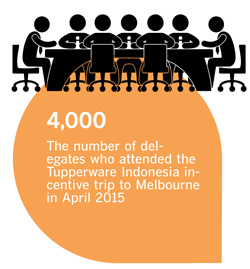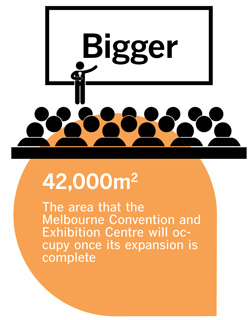
Melbourne’s new brand positioning is designed to drive success for its clients by being the ultimate MICE destination. By Rebecca Elliot
It has been just over three years since the Melbourne Convention Bureau (MCB) launched Melbourne IQ: The Intelligent Choice for Conferences, the city’s inaugural marketing campaign for business events under CEO Karen Bolinger.
Designed to showcase the city’s knowledge capabilities, Melbourne IQ positioned Melbourne as a business events destination “beyond the bricks and mortar”, according to Bolinger.
While Melbourne was one of the first cities globally to market its intelligence as a unique selling proposition to the MICE industry, the terms ‘knowledge economy’ and ‘intellectual capital’ have become buzz phrases in recent years, leaving Bolinger and her team to ponder, where to next?
Enter The Melbourne Effect, launched by MCB at IMEX Frankfurt in May, which Bolinger explained, is the evolution of Melbourne IQ.
“We’ve got the bricks and mortar, we’ve got the intellectual capital. The Melbourne Effect is about bringing this to life and actually making a difference to your conference – once you’ve had your conference, what does it leave behind?” said Bolinger.
“We conducted extensive research across our key market segments – international associations and corporate and incentive planners – and what stood out was their desire for a city and bureau to not just tick the boxes, but to facilitate collaboration and deliver real outcomes.
“Melbourne is creating a real point of difference by driving action and real change, and creating legacies. These are becoming a compelling reason for planners to choose Melbourne,” she said.
Bolinger said the 20th International AIDS Conference hosted in Melbourne in 2015 was a prime example of The Melbourne Effect.
Over the four years prior to the conference, MCB enlisted the support of the local, state and federal government and other city stakeholders, and worked closely with the International AIDS Society right through to event execution.
Not only was it the largest health related conference ever hosted in Australia, attracting more than 13,000 delegates to the city and delivering A$80 million (US$59 million) to the local economy, it also saw Australia’s health ministers sign the AIDS 2014 Legacy Statement, signifying their commitment to see the virtual elimination of new HIV infections by 2020.
While Melbourne IQ was squarely targeted at the international association market, The Melbourne Effect also translates to the corporate and incentive travel market.
“The Melbourne Effect speaks to everything about the city; its ability to transform ideas into innovations, the community into a collaborative force and the everyday into immersive experiences,” said Bolinger.
“For the corporate planner, it’s not about education, it’s about creating a tailored experience for their group that has a wow factor and inspires their staff to increase sales.”
Given that Melbourne is a city that many describe as immersive and one to experience rather than being famed for its iconic attractions like Sydney is for its Harbour Bridge and Opera House, Bolinger said The Melbourne Effect will enhance the city’s appeal in Asia in particular because it will allow planners to more easily describe and sell the destination.
At the end of May, MCB co-hosted a familiarisation with Business Events Australia, which was attended by corporate buyers from Indonesia, Malaysia and Singapore from a variety of industries including direct sales, manufacturing and FMCG.
While the trip was not themed The Melbourne Effect, it provided MCB with an opportunity to test out the concept with the buyers while they were experiencing the city.
The three-day familiarisation saw the group participate in quintessentially Melbourne experiences including a coffee and street art tour, a hot air balloon ride over the city and a day trip to Phillip Island to see the famous Penguin Parade.
MCB’s director corporate meetings, incentives and membership Jasmine Lim said: “We verbally shared with them the thinking behind The Melbourne Effect and everyone took to it positively. By the end of the famil they were using it to describe the positive outcomes of the famil for themselves.”
The story behind The Melbourne Effect is available on MCB’s website and Bolinger said the campaign would be rolled out through bids, presentations and other platforms over the next 12 months.
“It’s evolving as it’s going and we’re really happy with it.”

{Talking numbers}



{Spotlight}

DoubleTree by Hilton Melbourne – Flinders Street is the latest hotel to open in the World’s Most Liveable City and joins its sister property, Hilton Melbourne South Wharf. Formerly the Citigate Melbourne, the hotel underwent a multimillion dollar refurbishment before opening in December 2014.
Owned by M&L Hospitality Group and managed by Hilton Worldwide, the 180-room boutique-style hotel neighbours Flinders Street Station and takes many of its design cues from the Melbourne icon, even down to the bed headboards which are inspired by the concertina folds connecting the train carriages.
Hotel manager Clinton Farley said: “The hotel has performed exceptionally well since opening and is ahead of market expectations. The completion of our refurbishment combined with our global brand, team culture, management and prime downtown CBD location has assisted in a significant shift in the market mix to become a hub for corporate guests throughout the week and leisure on weekends.”
Upon entering the hotel, the check-in desk doubles as a funky, inner-city bar, which is the perfect location to enjoy the complimentary DoubleTree by Hilton signature warm chocolate chip cookie with a drink.
Guestrooms come in king, queen and twin configurations with custom designed features, like the black-and-white photographs of the city, by interior designers Mill Interiors and Dreamtime Australia Design. The king guestrooms on the higher floors boast spectacular views of the bustling station below.
The first level of the 13-storey hotel houses two meeting rooms, which when combined can seat 140 delegates. In addition, a boardroom is available along with a 24-hour business centre.
The in-house restaurant Platform 270’s dining room has a distinct industrial feel reminiscent of the city’s famed laneways. Head chef Tony Moss has created a playful modern Australian menu that utilises ingredients from the hotel’s rooftop garden and regions in Victoria.
{Insights}
Pamela McMurtry, head of groups and events, The Conference Team, gives three ideas that one should add to the itinerary when holding events in Melbourne
Progressive dinner experience
Melbourne is full of multicultural dining experiences. The best way for a delegate to experience some wonderful dining opportunities is to organise a progressive dinner.
Art scene
If art is your thing, there are guided tours through the city which take your delegates into laneways to see graffiti art, as well as museums.
Go on a regional day trip
A visit to Melbourne is not complete unless your group experiences some of the world-class wines that come from different regions around Melbourne such as Yarra Valley.






















